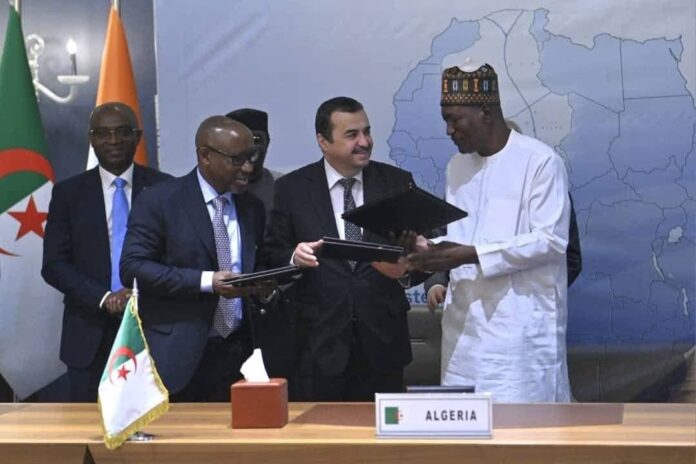By Yahaya Umar
Nigerian government has signed agreements with Algeria and the Republic of Niger to advance the Trans-Saharan Gas Pipeline ,TSGP, and enhance gas supplies to European markets.
Officials from the three African countries reportedly signed the agreements at a meeting for the project in Algiers, the Algerian capital, on Tuesday, February 11, 2025.
According to a post by President Bola Tinubu’s Special Assistant on Social Media, Dada Olusegun, the agreements signed involved energy companies from the three companies.
He also noted that the agreements included a contract for updating the project’s feasibility study, a compensation agreement, and a Non-Disclosure Agreement ,NDA.
The statement read: “Nigeria, Algeria, and Niger have signed agreements to advance the Trans-Saharan Gas Pipeline ,TSGP, a project aimed at linking Africa’s gas reserves to European markets.
“These agreements include a contract for updating the project’s feasibility study, a compensation agreement, and a Non-Disclosure Agreement ,NDA, among the energy companies from the three nations.
“The TSGP represents a strategic initiative designed to establish a continental pipeline for transporting natural gas from Nigeria, through Niger, to Algeria, facilitating exports to European markets and other international destinations”.
The Trans-Saharan Gas Pipeline ,TSGP, is a project that involves constructing a pipeline across the Sahara Desert, linking Nigeria’s Warri hydrocarbon fields to Algeria’s Hassi R’Mel hub on the Mediterranean coast
The TSGP is expected to transport up to a trillion cubic feet of natural gas annually through 2,565 miles of pipeline. Algeria’s portion, spanning 1,435 miles, accounts for over half the total length.
Originally proposed in the 1970s, the project saw progress in 2002, 2005, 2006, and 2009 before stalling, the Energy/Petroleum Ministers of Algeria, Niger, and Nigeria met in 2022 to revive the project.
An estimated $13 billion in investment is needed $10 billion for construction and equipment and $3 billion for gas gathering centers to bring the TSGP to fruition.
Nigeria has the largest gas reserves in Africa and is among the world’s top 10 countries with the largest gas reserves. Yet, most of its reserves are untapped due to limited infrastructure and investment in the upstream sector.
The recent gas supply shortages in Europe as a result of disagreements with Russia, have disrupted the global gas supply chain, with European countries now relying on the U.S. for Liquified natural gas. There are still gas shortage concerns.
Experts say Nigeria could have benefited from the gas supply cuts in Europe but the country was not prepared.
Although Nigeria exports a significant amount of natural gas, primarily in the form of Liquefied Natural Gas ,LNG, to Europe, its share of the European market is not substantial.
President Tinubu said in December 2023, that he was looking to help Nigeria compete with Russia in energy supply to European markets.





